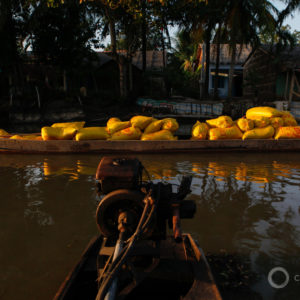Federal Water Tap, August 26: Congress Gets Water Lessons on Summer Break
The Rundown
Great Lakes senators learn about water issues in their home states while Congress is on summer break. U.S. Geological Survey researchers quantify the benefits of prairie and wetland restoration in western Minnesota and test urban stormwater runoff for chemicals. The U.S. Agency for International Development signs a collaborative agreement with its Israeli counterpart to work on water and food issues. And lastly, the vice president touts a “boundless energy future” while in the Permian basin.
“You know, it really is amazing to be back in the Permian basin. I was in West Texas not long ago and got to see firsthand the incredible, incredible drive toward American energy independence that’s happening here. It’s truly inspiring. And as I leave here today — and let you all find a little shadier or cooler place to be — I want to tell you, in my heart of hearts, I believe there’s only two things that stand in the way of a boundless energy future, a future of American energy independence. The first is, we need to pass the [U.S.-Mexico-Canada trade agreement]. And that’s going to open the door to a boundless future of American energy. That’s number one. And second, we need to stand up and speak out with one voice. As we see this energy renaissance happening all across America, we have to reject the radical climate change agenda that is wanting to turn America’s energy clock backwards. Am I right? We’ve got to say ‘yes’ to America’s energy independence and ‘no’ to the Green New Deal.” — Vice President Mike Pence speaking in Artesia, New Mexico to promote the U.S.-Mexico-Canada trade agreement, which the administration wants Congress to pass.
In context: New Mexico Oil Production Is Soaring. Now What to Do with the Wastewater?
By the Numbers
$17 million: Funding to assist five communities with planning, designing, or building water recycling facilities. The communities are in California, Hawaii, and Texas. (Bureau of Reclamation)
News Briefs
USAID Partners with Israel
Mark Green, the administrator of the U.S. Agency for International Development, signed a memorandum of understanding with MASHAV, the Israeli international development agency, to spur cooperation in projects, research, and trainings.
Water and food security are two of the seven focus areas for the partnership. The two countries will emphasize collaboration in Africa, Latin America, and the Caribbean.
Senators Look at Local Water Issues
Congress is on recess, but representatives aren’t taking a complete break. A few senators have spent their time away from Washington to learn about water in their home states.
Michigan’s Democratic Senate duo — Gary Peters and Debbie Stabenow — visited Belle Isle, near Detroit, and advocated for increasing federal ecosystem restoration funding for the Great Lakes, Detroit News reports.
Sen. Rob Portman (R-OH) toured Cuyahoga Valley National Park and advocated for funding to maintain the country’s national parks. He also discussed Lake Erie during roundtables in the lakeshore towns of Ashtabula and Sandusky.
Sen. Tammy Baldwin (D-WI), meanwhile, may have had the most extensive water lesson. Baldwin met with leaders of The Water Council, a water technology incubator in Milwaukee. She then learned about harmful algal blooms while at Lake Menomin in northwestern Wisconsin. “Heading to the lake shouldn’t mean being greeted by dangerous toxins in the water,” Baldwin tweeted.
Baldwin also spent a day on the Mississippi with agricultural trade groups to discuss the river’s navigation system and its importance for farm products. Locks and dams on the upper Mississippi were closed for nearly three months this summer because of high water levels, halting barge traffic on large sections of the nation’s main river highway.
Studies and Reports
Chemical Stew in Urban Stormwater
The water that washes off of city streets is often a noxious mix of chemicals. U.S. Geological Survey researchers tested urban stormwater to see what was in it. A lot, it turns out, and in environmentally damaging concentrations.
The researchers took water samples after 50 storm events at 21 sites across the country. They found pesticides, pharmaceuticals, household chemicals, and PAHs, which are formed after burning fossil fuels and from car exhaust. The median number of chemicals in a sample was 73.
More impervious surface and more development were correlated with higher chemical loads and concentrations. The study was published in the journal Environmental Science and Technology.
Measuring the Benefits of Wetland and Prairie Restoration
Over the last decade prairies and wetlands were plowed under and converted to cropland at an increasing rate in the upper Midwest. The benefits of these water- and carbon-storing landscapes are well understood but poorly quantified.
U.S. Geological Survey researchers set about to do just that: measure the benefits. To do so they tracked ecological changes as cropland was turned back into native habitat at Glacial Ridge National Wildlife Refuge in western Minnesota.
The changes were “substantial.” Researchers found improvements in water quality, an increase in stream base flow, a slowing of surface runoff during storms, and a rise in groundwater recharge. The results can be used to target restoration projects in the areas of greatest benefit.
Researchers in Iowa have documented similar benefits for water storage, erosion control, and nutrient retention when strips of prairie are integrated into farm fields.
On the Radar
Proposed Clean Water Act Change
The EPA’s proposal to narrow state water quality permitting under the Clean Water Act was published in the Federal Register, which opens a 60-day public comment period. The proposal also restricts state reviews to one year.
Submit comments by October 21 via www.regulations.gov using docket number EPA-HQ-OW-2019-0405.
Camp Lejeune Meeting
The Camp Lejeune community advisory group will hold its next meeting on September 13 and 14, in Arlington, Virginia. The group, which was formed in the wake of decades-long water contamination at Camp Lejeune Marine Base, in North Carolina, consults with federal scientists on health studies. The base’s water was contaminated with TCE, PCE, vinyl chloride, and other chemicals, which led to higher risk of cancers and birth defects.
Federal Water Tap is a weekly digest spotting trends in U.S. government water policy. To get more water news, follow Circle of Blue on Twitter and sign up for our newsletter.
Brett writes about agriculture, energy, infrastructure, and the politics and economics of water in the United States. He also writes the Federal Water Tap, Circle of Blue’s weekly digest of U.S. government water news. He is the winner of two Society of Environmental Journalists reporting awards, one of the top honors in American environmental journalism: first place for explanatory reporting for a series on septic system pollution in the United States(2016) and third place for beat reporting in a small market (2014). He received the Sierra Club’s Distinguished Service Award in 2018. Brett lives in Seattle, where he hikes the mountains and bakes pies. Contact Brett Walton





Leave a Reply
Want to join the discussion?Feel free to contribute!